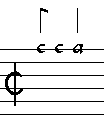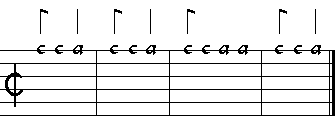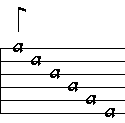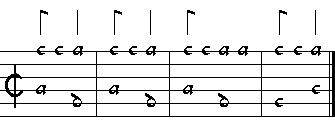Tablature
Lute music is notated in tablature.
Tablature
consists of: 1. A six-line staff. 2. Letters. 3. Rhythm symbols.
- The six lines stand for the upper six courses of the lute. The highest
pitched course is indicated by the topmost system line.
- The letters show in alphabetical order which fret to stop, a = open
string, b = 1st fret, c = 2nd fret, d = 3rd fret etc. The letter "j"
is not used in order to avoid confusion with the letter "i".
- Rhythmic symbols showing how long a note sounds are written over tablature
letter. If you see no new symbol for a while, it means that all the
notes are the same length as the last symbol.
Your
First Tune
Put
the tip of the middle finger of your left (fingerboard) hand on the
second fret (tablature letter c) of the first (highest tuned) course/string.
Pluck the course twice with the thumb of your right (striking) hand.
Then remove the left hand finger from the c fret and pluck the open
course (tablature letter a) once with the thumb of your right hand.
What you just played looks and sounds like this:
Now go on and play the whole tune:
Tuning
The
first (highest tuned) course is tuned to g1, the 2nd to d1, the 3rd
to a, the 4th to f, the 5th to c and the 6th to G. If you play guitar,
the tuning is: e1, b, f-sharp, d, A and E. (ie.: to play lute music
on your guitar, just lower the g-string to f-sharp and you're ready!)
Tuning
Lute:
Tuning
Guitar:
Your
First Two Part Tune
When two (or more) letters are placed above each other, they should
be played together. Use your right hand index (.) and middle (..) fingers
in alternating strokes for the upper (highest sounding) voice and the
thumb for the lower voice. It looks and sounds like this:
|




